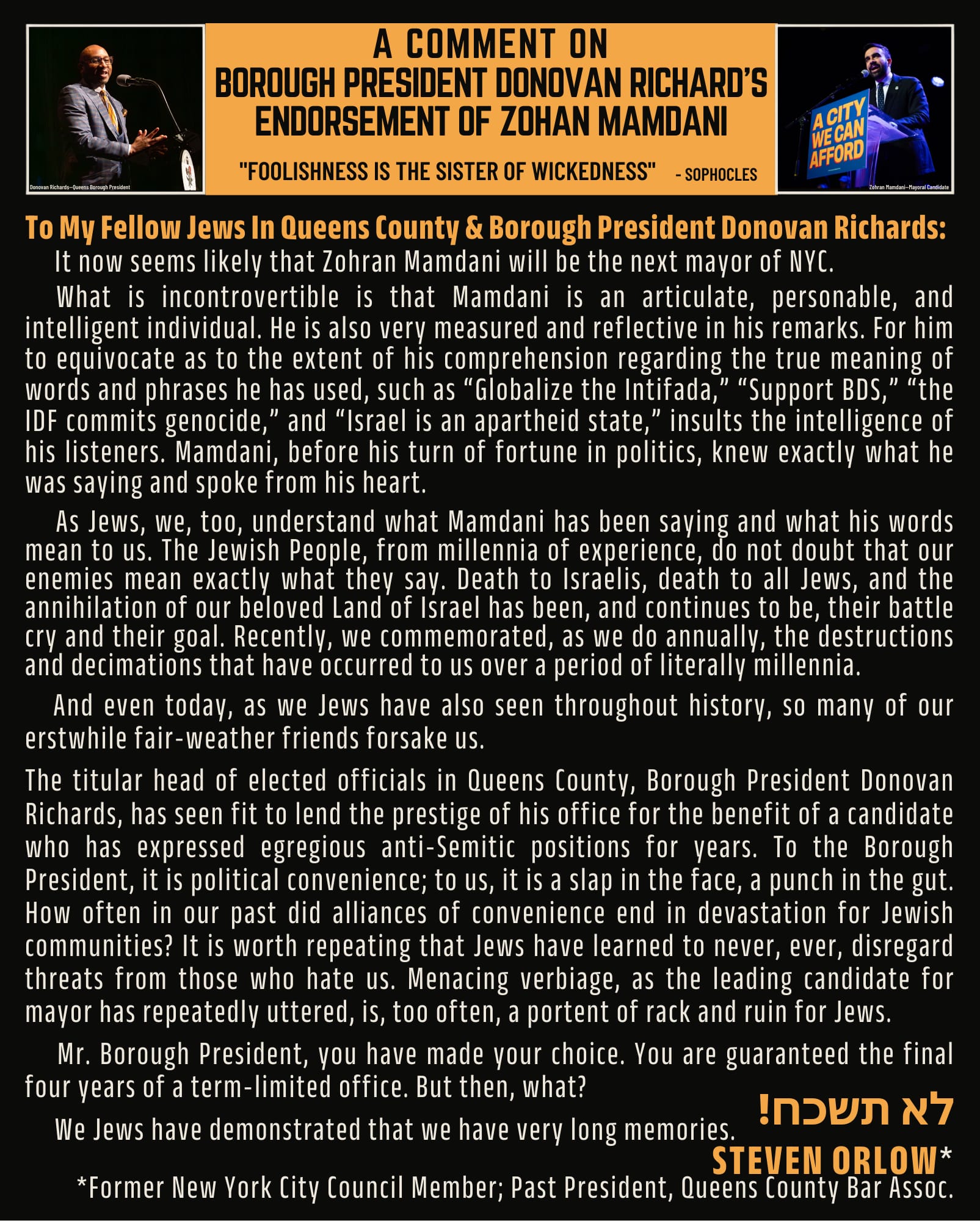
One of the reasons why Parashath Naso is the longest one, is on account of the repetition of what all the Nesiim (Princes) brought. This begs the question, why was it necessary to repeat all the Qorbanoth of the Nesiim? They all appear to be repetitions of each other. Couldn’t the Torah simply state the offering of the first prince and add that this is what each of the Princes brought? We are told that there isn’t one unnecessary word in the Torah, yet the Torah writes the same thing twelve times.
Rabbenu Bahya writes that if the Torah only mentioned the first one which happened to be the offering of Nahshon Ben ’Aminadab, it would give honor to him, but would detract from the honor of the other Princes. We can see from this, that G-d wished to give the full honor due to each and every one of them. Even though G-d knew that some would be part of the rebellion of Qorah, nevertheless, G-d judges a person based on his deeds at that moment, and gives them their deserved honor and reward.
Another reason is that even though each Prince brought the identical offering to the other, each one of them had a different intent in bringing them. Each Princes intent, was uniquely connected to his own tribe.
The following explanation is one, that I personally, find very powerful, in explaining the reason why G-d repeated the offerings.
The Torah portion begins with: (Bammidbar, 7:12)וַיְהִי הַמַּקְרִיב בַּיּוֹם הָֽרִאשׁוֹן אֶת־קָרְבָּנוֹ נַחְשׁוֹן בֶּן־עַמִּֽינָדָב לְמַטֵּה יְהוּדָֽה:
And it was that the one who brought his offering on the first day, was Nahshon Ben ’Amminadab, of the Tribe of Judah.
The Torah begins with the word “and”, as if it is being mentioned in passing, inserted between other matters. Additionally, his title is not mentioned.
For the tribe of Yissakhar it says:
בַּיּוֹם הַשֵּׁנִי הִקְרִיב נְתַנְאֵל בֶּן־צוּעָר נְשִׂיא יִשָּׂשׂכָֽר:
On the second day, Nethan-el Ben Su’ar, brought his offering, and the Torah adds: the Prince of Yisskhar. This time, it is not preceded by the word and, and the Torah gives his position more importance.
ב??????? ????????????? ??????? ??????? ???????? ???????? ???????????ַּיּוֹם הַשְּׁלִישִׁי נָשִׂיא לִבְנֵי זְבוּלֻן אֱלִיאָב בֶּן־חֵלֹֽן:
On the third day, it says that the Prince of the sons of Zebulun, was Eliab Ben Helon.
In the eyes of the world, the King is the most important person. Nahshon Ben ’Amminadab, who was the Prince of the Tribe of Judah, from whom David, the King of Israel and the Massiah come, is therefore, the most important of the Princes. The tribe of Yissakhar were the Tribe who dedicated themselves, full time to the study of the Torah, therefore, they are the second in importance in the eyes of the people, and are the second to be mentioned. All the other Tribes follow.
The Torah, wishing to give each Prince and each Tribe its own due importance, downplays the importance of the most important Tribe, by beginning with the word “and”, as if it were being mentioned only in passing. Even though Yissakhar does not begin with the word “and”, it is, nevertheless, not given the same weight and importance as the other Tribes. The way the remaining Tribes are announced, is much more important than the first two.
Additionally, Nahshon Ben ’Amminadab’s title and position are not even mentioned. Nethan-el Ben Su’ar’s title is mentioned, though almost in passing. From Eliab Ben Helon on, the Princes are given their full title.
How can we understand the reason for this? It seems to me that we can, perhaps, best explain it through the following Mashal.
The President of the most important country in the world, went on a world tour, during which it would be decided which of the countries visited would be granted preferential status in matters of trade. Each country put on a big show for the President, hoping to impress him favorably and be able to win lucrative trade contracts.
Let us give this President a name. I propose giving him the last name of Standing, and for the first name we will give him Major, “Major Standing”. The name of his country we will call “Grandland”. When President Major Standing visited the first country of his trip, the Prime Minister of the country rose to welcome him and spoke a few words and then announced, “And while I’m on the topic, ladies and gentlemen, I would like to introduce Major Standing of Grandland.
President Standing was not impressed by this introduction. It had been included as part of a general introductory speech, it did not mention his title, and was generally lacking in the honor he had been expecting as the president of the most powerful nation on earth.
When he and his entourage arrived at their second destination, the Prime Minister of that country also organized a major reception for the visiting President. He rose to introduce him and said, “Ladies and gentlemen, may I introduce to you President Major Standing of Grandland. The President definitely preferred this introduction, but still felt something was lacking. Certainly at this stage though, this country was in the running for receiving lucrative trade contracts.
When they visited the third and final country on their world tour, the Prime Minister of that country organized a reception which was similar to the previous two. His introduction, however, was much more flattering to the visiting President. He said, “Ladies and gentleman, may I introduce to you, the President of Grandland, Major Standing”. Before mentioning the President’s name, he gave him the full weight and importance of his title and the country he represented: “the President of Grandland, Major Standing”. The President’s chest swelled with pride as the attending dignitaries applauded. It will come as no surprise that it was the third country who received the most lucrative contracts.
The Torah, in announcing the names of the Princes, doesn’t wish to slight the Princes of the Tribes of lesser standing. Therefore, it only introduces the most important Prince, who is the head of the Tribe of the Kings of Israel, in passing, without even his title. The head of the Tribe who studied Torah constantly, who is slightly less important in the eyes of the people, is given his title, but only in passing.
When it comes to the other Tribes who do not carry the same weight or importance, however, the Torah gives them the full weight and importance of their title and position, so as not to diminish or denigrate their importance in anyone’s eyes. G-d is showing through the fact that each of the offerings was mentioned separately, even though it is repetitive, plus the fact that they were announced differently, that each and every offering was accepted and appreciated individually and equally by G-d.
The Ohr Hahayyim Haqqadosh also writes about the fact that for the Tribe of Yehudah it does not say “Prince” (Nasi). His explanation is that this is because Nahshon Ben ‘Amminadab, the most important Prince of the most important Tribe in the eys of the people, did not consider himself to be a Prince. He looked at himself as if he was just another member of the Tribe, such was the extraordinary level of his humility.
Rabbenu the Hid”a similarly asks about Nethan-el Ben Su’ar, the Prince of Yisskhar, why the word Nasi is written Nesi, simply connecting the word to the name of the Tribe and not giving him the full status of his title. He explains that in this case too, had the word been written “נָשִׂיא”, this would be a word that stood by itself, not dependent on any other word. The fact that it is written “נְשִׂיא”, shows that this is dependent on another word. The reason is that he too, was so humble that he did not consider that he was an important Prince, standing upright on his own, but rather, that he was part of the Tribe. In addition, the fact that his title was mentioned after his name, is also testimony to his humility which came through the fact that he, like his Tribe, devoted their existence to the study of Torah, and the Torah can only be acquired through humility.
By Rabbi Ya’aqob Menashe
Rabbi Ya’aqob Menashe is a renowned author and lecturer, whose Shiurim continue to inspire thousands around the world. Many can be seen at www.NonstopTorah.com. His daily Torah Minutes are eagerly anticipated by thousands every morning. They can be seen at www.ATorahMinute.com. Rabbi Menashe is the spiritual leader of Midrash BEN ISH HAI. More information is available at the Midrash website, www. Midrash.org.
Humility
Typography
- Smaller Small Medium Big Bigger
- Default Helvetica Segoe Georgia Times
- Reading Mode













